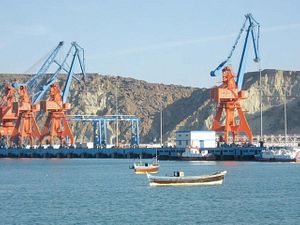In the run-up to Pakistan’s general election on July 25, most political parties stand united in their belief that the China-Pakistan Economic Corridor (CPEC) will transform Pakistan’s ailing economy. In May, Pakistan’s ambassador to China asserted that “regardless of any political change in Pakistan, our commitment towards the successful completion of CPEC will not change.”
But if political support at the national level appears unwavering, local opposition is growing over the lack of consultation and concerns regarding the inequitable distribution of the prospective benefits. In few places is this more noticeable than the southern Balochistan fishing town of Gwadar, the entry point of the corridor and a microcosm of the center-periphery tensions elsewhere that threaten CPEC’s implementation.
An Ambitious Vision
Aiming to develop a “growth axis and development belt” between China and Pakistan, CPEC could involve investments of some $60 billion. The corridor connects Gwadar, in the southwestern province of Balochistan, to China’s Xinjiang region via a 2,700 kilometer route through the mountainous terrain of Gilgit-Baltistan in northernmost Pakistan .
For China’s and Pakistan’s foreign policies, the potential payoffs are clear. CPEC is a flagship project of Beijing’s Belt and Road Initiative (BRI), a geopolitical ambition to develop trade and infrastructure with over 60 economies across Eurasia, Africa, and beyond. For Islamabad, CPEC brings the hope of not only economic dividends but also potentially a geopolitical reconfiguration. Some Pakistani strategists believe deepening ties to China will offset rising U.S. diplomatic and economic pressure aimed at ending Islamabad’s support to Afghanistan- and India-oriented militant proxies.
CPEC’s prospective economic benefits are forecast to materialize slowly across Pakistan between 2017 and 2030. But policy planning has been opaque, omitting details of how development projects will actually impact local economies, infrastructure and business. An urban planner and expert on Gwadar said the government’s plan lacks even “cosmetic consultation.” As more details slowly emerge, local alarm is growing about what CPEC will bring to Balochistan.
Stirring Local Unrest
In Gwadar, the Arabian Sea town in southern Balochistan that CPEC aims to transform into a bustling commercial port, inner city locals fear displacement over government plans to expropriate land, bulldoze the old city, and resettle residents. The state-led land grab is estimated to claim at least 290,000 acres to make way for development, in large part through ultimatums issued to local residents. Those who refuse to sell land or property could simply have it seized by the federal government and would likely face forced resettlement.
Local livelihoods also appear to be under fire. Fisher folk, whose daily catch provides them just enough to feed their families, have on occasion been denied access to the sea and could face the permanent closure of Gwadar’s jetty. Unskilled workers resent exclusion from the port’s construction, as federal authorities favor importing labor from other provinces. One official in Gwadar said that “the plan seems to be to make life so miserable for the residents that they leave on their own.”
Nor is it clear that those who stay in Gwadar will reap the fruits of Chinese investment. At the start of the project, Pakistan transferred leasing rights for Gwadar port to the China Overseas Port Holding Company, sealing a deal that grants China 91 percent of the port-generated profits and Islamabad just 9 percent, while denying Balochistan’s provincial government any revenue. With such lopsided terms, China is under minimal pressure to ensure local prosperity.
Anti-Chinese sentiment is rising in step with suspicions of Beijing’s intentions. Some Pakistani security analysts see China’s development plans as a mask for broader geopolitical ambitions. In Gwadar, they perceive Beijing as less interested in developing a transport link to Xinjiang or a commercial waystation to the Arabian Sea and Persian Gulf than eventually transforming the port into a military or naval base, another in a string of installations dotted across the Indian Ocean that affords Beijing the strategic initiative vis-à-vis regional rival India.
Regardless of China’s true intentions, the net result for locals is the same. Economic marginalization is stirring local dissent, which could lead to significant security risks. Balochistan’s insurgency has long rested on popular demands for greater political and economic autonomy. The failure to provide Gwadar the benefits of CPEC development is heightening hostility toward Islamabad and Beijing, and affording Baloch insurgents a chance to expand their outreach and recruit disgruntled locals. Since 2017, Baloch militants have already killed scores of Pakistanis employed on CPEC projects and future attacks might target Chinese construction workers or Chinese nationals living in Pakistan.
A Chance to Reverse Course
Instead of addressing the causes of this dissent, Pakistani authorities have opted to respond through crackdowns of anti-CPEC protests, an overbearing security presence, and harassment and intimidation of local residents. The best chances for the country’s stability – not to mention CPEC’s success in Gwadar and elsewhere – lie in giving provinces and communities a voice in shaping development projects.
In particular, the government should make greater efforts to consult communities and experts regarding the impact of development and reconsider the ongoing policy of rampant land expropriation. It should also put in place measures to ensure the employment of local labor on construction projects to ensure that they reap the dividends of outside investment. Chinese and Pakistani companies, too, ought to take similar measures to assess the risks associated with controversial development initiatives.
Whatever the result of Pakistan’s elections, the new parliament should seize the opportunities of a fresh mandate by informing a new government policy. That policy should have the well-being of Pakistani citizens at its heart, rather than treating it as expendable in the pursuit of mega-development.
Michael Kovrig is Senior Advisor for North East Asia at International Crisis Group, the independent conflict prevention organization.

































